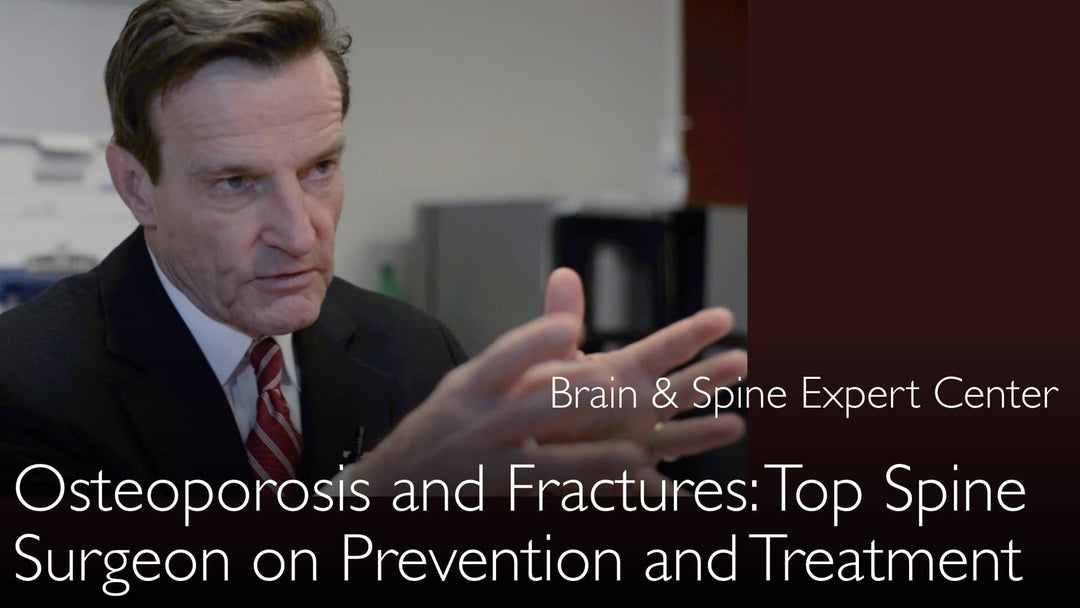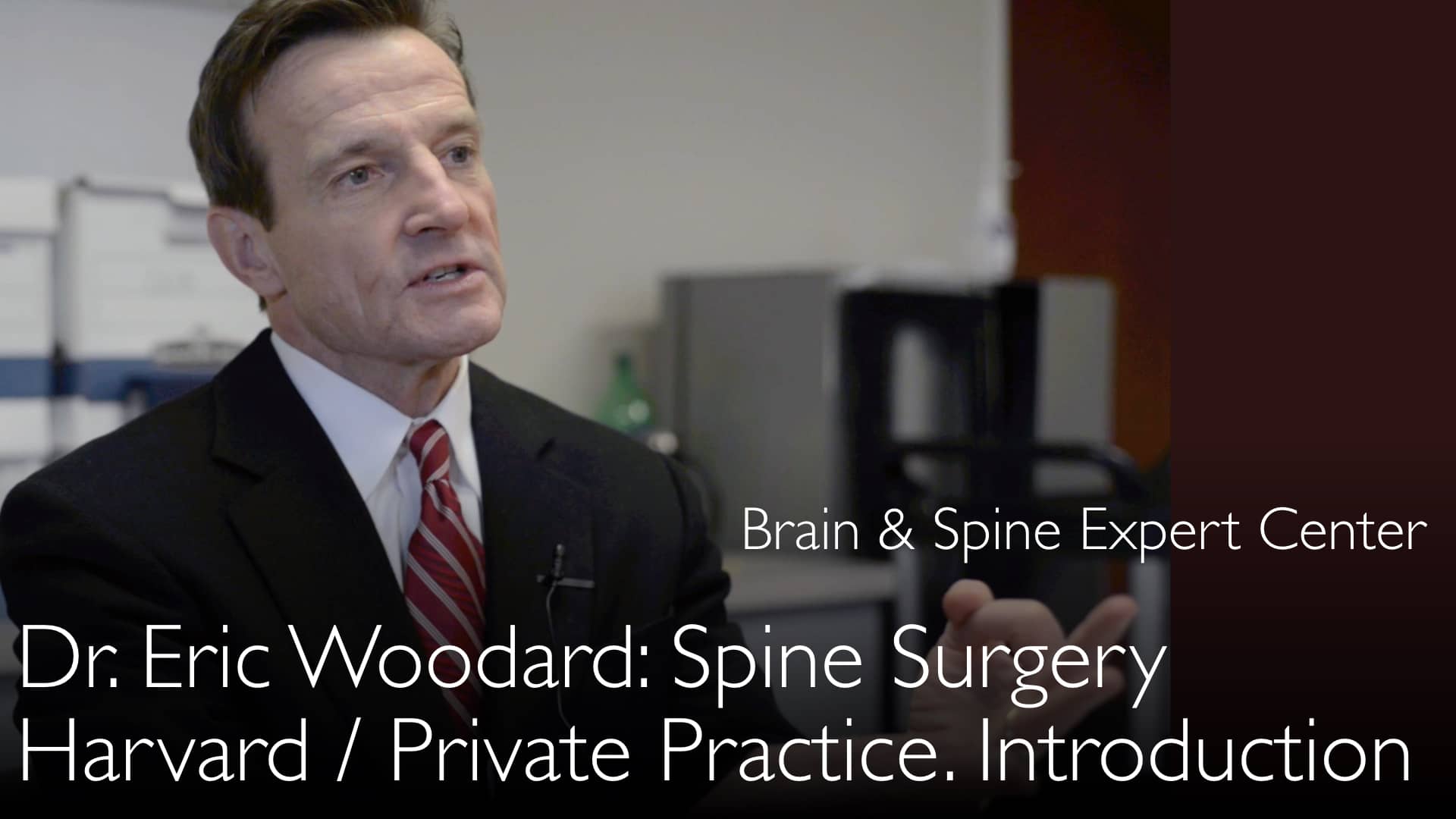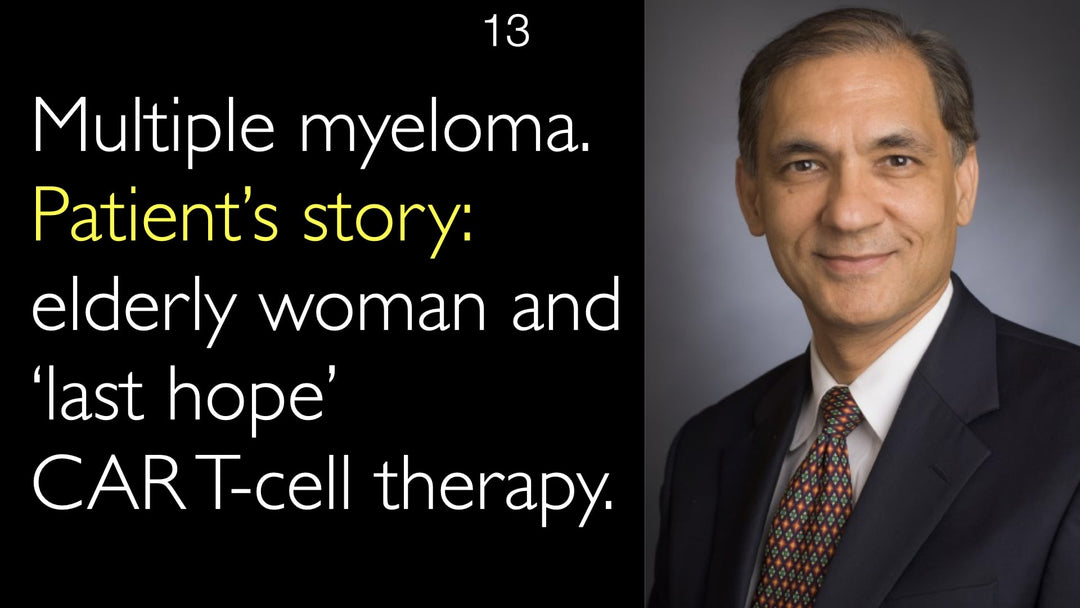Leading expert in spine surgery, Dr. Eric Woodard, MD, explains the complex relationship between osteoporosis and spinal procedures. Osteoporosis causes bones to lose calcium and mineral content, leading to debilitating vertebral compression fractures. Dr. Woodard details how this bone condition complicates surgical fixation, requiring specialized techniques. He discusses the role of prevention through nutrition and calcium intake before age 30. The interview also covers the limited benefits of vertebroplasty and kyphoplasty procedures for treating fractures.
Osteoporosis and Spinal Surgery: Causes, Complications, and Treatment Options
Jump To Section
- Understanding Osteoporosis Causes
- Genetic Risk Factors
- Prevention Strategies
- Vertebral Compression Fractures
- Surgical Treatment Options
- Osteoporosis Spine Surgery Challenges
- Full Transcript
Understanding Osteoporosis Causes
Osteoporosis is a complex metabolic bone disorder characterized by progressive loss of bone mineral density. Dr. Eric Woodard, MD, explains that the condition fundamentally involves bones losing their calcium and mineral content. This degenerative process weakens the skeletal structure over time, making bones more susceptible to fractures. The spine is particularly vulnerable to osteoporotic changes due to its weight-bearing function and complex biomechanics.
Genetic Risk Factors
Genetic predisposition plays a significant role in osteoporosis development. Dr. Eric Woodard, MD, notes that individuals of Scandinavian and Northern European ancestry demonstrate higher susceptibility to osteoporosis compared to Southern Europeans or Latin Americans. This genetic component interacts with environmental and lifestyle factors throughout life. The interview with Dr. Anton Titov, MD, highlights how these inherited patterns influence bone health trajectories and fracture risk in aging populations.
Prevention Strategies
Optimal bone mineral accumulation before age 30 provides critical protection against later osteoporosis. Dr. Eric Woodard, MD, emphasizes that maximizing nutrition during youth, particularly calcium intake through dairy products, establishes a higher bone mineral baseline. This foundation becomes increasingly important as natural bone mineral loss accelerates, especially in postmenopausal women who experience hormonal changes that abruptly increase mineral loss rates. Dr. Anton Titov, MD, explores these prevention concepts during their discussion.
Vertebral Compression Fractures
Osteoporotic vertebral compression fractures represent a devastating complication of advanced bone loss. Dr. Eric Woodard, MD, describes how these fractures typically occur at the highest stress points in the spine, particularly the midpoint of the thoracic region. The mechanical failure of vertebrae causes severe pain and can lead to debilitating functional limitations. In rare cases, vertebral collapse may cause spinal cord compression with potentially devastating neurological consequences requiring immediate medical attention.
Surgical Treatment Options
Vertebroplasty and kyphoplasty procedures have been developed to address osteoporotic compression fractures. Dr. Eric Woodard, MD, explains that vertebroplasty involves injecting cement directly into the fractured vertebra, while kyphoplasty uses a balloon to create a cavity before cement injection. However, recent rigorous clinical trials have shown only marginal and transient benefits for these procedures. Dr. Eric Woodard, MD, notes they remain an option rather than a strong recommendation for severe symptomatic fractures.
Osteoporosis Spine Surgery Challenges
Osteoporosis presents significant challenges for spinal surgeons addressing other pathologies like deformity, stenosis, or spondylolisthesis. Dr. Eric Woodard, MD, explains that standard fixation devices often prove inadequate in osteoporotic bone, as screws cannot achieve proper purchase. Surgeons must employ specialized techniques, including longer constructs that distribute stress across more segments. This mechanical advantage helps compensate for poor bone quality. Dr. Anton Titov, MD, and Dr. Woodard discuss how these adaptations are crucial for successful outcomes in osteoporotic patients requiring spinal surgery.
Full Transcript
Dr. Anton Titov, MD: Osteoporosis causes and spinal surgery. What are the ultimate causes of osteoporosis? Age-related degeneration of the spine is the main reason for spine surgery. Osteoporosis makes every type of spinal surgery more difficult.
A leading spine surgeon discusses how to overcome osteoporotic changes when spine surgery is required. How kyphoplasty and vertebroplasty have not fulfilled initial expectations of treating osteoporotic compression fractures.
Osteoporosis causes and spinal surgery. Back surgery for osteoporosis is required when compression fractures occur. Osteoporosis is caused by progressive loss of bone calcium after menopause. It is important to build calcium in bone before age 30.
Video interview with a leading expert in spine surgery. Osteoporosis causes and spinal surgery make a complicated situation. Osteoporosis leads to spine fractures by the mechanism of vertebral compression.
Surgery for osteoporosis of the spine is indicated to inflate collapsed vertebrae. This is called kyphoplasty and vertebroplasty. A medical second opinion helps to determine if vertebroplasty or spinal fusion due to osteoporosis can treat the patient.
A medical second opinion also helps to choose the best method to treat vertebral fracture due to osteoporosis. Seek a medical second opinion on osteoporosis-related fractures to be confident that your treatment is the best.
Management of osteoporosis in spine surgery demands greater length extension for the hardware because screws do not hold well in osteopenic bone. Osteoporosis in the cervical spine can manifest by neck pain and hand numbness.
Back pain in the elderly could mean a spine compression fracture that requires a surgical operation. Osteoporosis causes are many. Often spinal surgery is required in patients with osteoporosis.
Back pain is a frequent symptom of osteoporosis of the spine in men. Back surgery for osteoporosis. Osteoporosis complications prevention.
Dr. Anton Titov, MD: Osteoporosis is a very big problem, especially in the aging population. In your practice, you see the effects of osteoporosis, the compression fractures.
How should patients prevent osteoporosis? How to treat osteoporosis? What advice do you give to patients regarding this very common condition?
Dr. Eric Woodard, MD: Sure. Osteoporosis can be a very challenging problem for spine surgery. In general, osteoporosis is a complicated process. In osteoporosis, the bone loses its mineral contents. The bone loses its calcium content.
This can be on a genetic basis individually. It can be on the basis of genetic ancestry. Typically, Scandinavians and Northern Europeans are much more prone to osteoporosis than Southern Europeans or Latin Americans.
There is clearly a genetic predisposition toward developing osteoporosis. Your bones take on and accumulate calcium and phosphate at an approximately constant rate to about age 30. Then you slowly lose mineral at a fixed rate.
Some of this is hormone-based. In women, once the hormonal changes at menopause occur, they will have an abrupt increase in the rate of loss of mineral of their bone. Since the curves are relatively similar in their shape, clearly the higher the mineral content you can achieve up to age thirty, the higher relative amount of mineral you'll have when your age is 60, 70, 80.
This is the reason behind strong recommendations in children, teens, and young adults to maximize their nutrition, especially with regard to taking calcium. Typically this is done with dairy milk products, things like that.
Certainly, nutritionally depleted or nutritionally deficient individuals in their youth will have a higher risk for osteoporosis later. Osteoporosis can be devastating in the elderly population who fall below certain thresholds in the spine especially.
Dr. Eric Woodard, MD: This is most typically at the highest stress points in the spine, the midpoint of the thoracic spine, for instance. The vertebrae nearly collapse due to mechanical failure.
When they collapse, obviously there is a tremendous amount of associated pain. This can be debilitating. In rare cases, the collapse is associated with narrowing or cord compression. This can be devastating from a neurological standpoint.
In recent years, there has been a lot of interest in treating osteoporosis aggressively. Treatment includes injection of various types of cement into the fracture, or even reducing or essentially re-inflating the vertebra with percutaneous or needle-based balloons.
The cavity is then filled with some cement. That is called a vertebroplasty procedure or a kyphoplasty procedure. Both these have been around for a number of years now. Vertebroplasty and kyphoplasty are widely practiced.
Now, just like any treatment, it is only good until you study it rigorously. Some of the more recent rigorous outcome clinical trials have shown only marginal and transient benefit of both vertebroplasty or kyphoplasty, that it is more of an option rather than a recommendation for folks who have severe symptomatic osteoporosis-related fractures.
Osteoporosis is a particular challenge in folks that have other spine pathologies, especially in patients who we are considering for surgery. We talked about spine surgery indications for deformity, stenosis, and spondylolisthesis.
To do standard surgical procedures on these folks with osteoporosis challenges us, because the typical fixation devices that we use for a standard patient prove inadequate in patients with osteoporosis. Screws don't hold.
Many times we have to spread out the stress and make the constructs stronger or even longer, that there is a mechanical advantage in this very poor area. It is very thin bone that will not hold screws, for instance.
Dr. Eric Woodard, MD: Osteoporosis is increasing; it is a challenge. Osteoporosis needs to be prevented ideally. There are a number of options to prevent osteoporosis fractures, both surgical and non-surgical treatment of these maladies.
Osteoporosis causes and spinal surgery. Video interview with a leading spine surgeon.
Dr. Anton Titov, MD: Best therapy for osteoporosis? How to keep the spine healthy into old age?








